|
|
|
Sort Order |
|
|
|
Items / Page
|
|
|
|
|
|
|
| Srl | Item |
| 1 |
ID:
112178


|
|
|
|
|
| Publication |
2012.
|
| Summary/Abstract |
In the thirty-two years from 1979 to 2011 there have been numerous mass movements in Iran and several Arab countries that have overthrown or threatened rulers who seemed secure for several decades. By September 2011, the shah of Iran and the presidents of Tunisia, Egypt, and Libya had been overthrown; of those, only the anti-Qaddafi revolt had outside (NATO) help. Major popular movements had also threatened the rulers of Bahrain, Yemen, and Syria. Iran had seen the massive Green Movement in 2009, aimed primarily at fraud in that year's presidential elections. Among the questions that emerge regarding these movements are the following: Why did they arise when they did? Why were they not predicted? How much influence did one or more of these movements have on the others? Why were some movements successful and others, thus far, not? Some of these questions will demand long study and analysis, which may not lead to a consensus. Here will be a preliminary brief discussion of a few of them, with stress on the question of influence.
|
|
|
|
|
|
|
|
|
|
|
|
|
|
|
|
| 2 |
ID:
112182


|
|
|
|
|
| Publication |
2012.
|
| Summary/Abstract |
Which Iranian uprising does the Arab Spring bring to mind? The Green Movement of 2009, which challenged the pillars of the Islamic Republic of Iran, or the Iranian Revolution of 1979, which brought the Islamic Republic to power?
|
|
|
|
|
|
|
|
|
|
|
|
|
|
|
|
| 3 |
ID:
112179
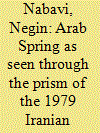

|
|
|
|
|
| Publication |
2012.
|
| Summary/Abstract |
Revolutions are by nature unpredictable and unsettling. That the wave of revolutions in North Africa and the Arab Middle East began so unexpectedly and spread with such speed, leading to the fall of the governments of Tunisia, Egypt, and Libya, has added to the concern regarding the "new order" that is to come after the initial euphoria. From the outset, the fear has been that these revolutions will follow the same trajectory as Iran did in 1979-in other words, that they will marginalize those who launched the revolutions and provide the grounds for the rise to power of the most savvy, purposeful, and best organized of the opposition groups, namely, the Islamists. Yet when one considers the recent uprisings in the Arab world through the prism of Iran's experiences in 1979, the parallels are not so evident. Mindful of the variations and distinctions between each of the revolutions in Tunisia, Egypt, and Libya, it would appear that in broad terms, and beyond superficial similarities, there is little in common between the events of Iran in 1979 and what has happened in the past year in the Arab world.
|
|
|
|
|
|
|
|
|
|
|
|
|
|
|
|
| 4 |
ID:
112181
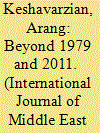

|
|
|
|
|
| Publication |
2012.
|
| Summary/Abstract |
In the midst of several research trips to Iran in the 1990s, I spent one year living and conducting exploratory research in Cairo. In Tehran, revolution seemed unfinished if not perpetual, yet in Egypt it was unimaginable. In spite of the entrenched support for the Leader and the political status quo, at this time Iran's reformist movement was robust. The policies of the Islamic Republic and consequences of the eight-year war with Iraq unleashed new social conditions that combined with established forces to push for women's rights, freedom of speech, independent civil associations, and exposing contradictions in the postrevolutionary order.
|
|
|
|
|
|
|
|
|
|
|
|
|
|
|
|
| 5 |
ID:
112172
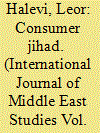

|
|
|
|
|
| Publication |
2012.
|
| Summary/Abstract |
This article deals with the origins, development, and popularity of boycott fatwas. Born of the marriage of Islamic politics and Islamic economics in an age of digital communications, these fatwas targeted American, Israeli, and Danish commodities between 2000 and 2006. Muftis representing both mainstream and, surprisingly, radical tendencies argued that jihad can be accomplished through nonviolent consumer boycotts. Their argument marks a significant development in the history of jihad doctrine because boycotts, construed as jihadi acts, do not belong to the commonplace categories of jihad as a "military" or a "spiritual" struggle. The article also demonstrates that boycott fatwas emerged, to a large degree, from below. New media, in particular interconnected computer networks, made it easier for laypersons to drive the juridical discourse. They did so before September 11 as well as, more insistently, afterward. Their consumer jihad had some economic impact on targeted multinationals, and it provoked corporate reactions.
|
|
|
|
|
|
|
|
|
|
|
|
|
|
|
|
| 6 |
ID:
112171
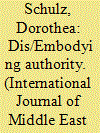

|
|
|
|
|
| Publication |
2012.
|
| Summary/Abstract |
This article explores how the introduction of sound reproduction technologies inflects what were previously considered authoritative, standardized, and gender-specific forms of religious leadership and how these changes affect in turn the (gendered) subjects of media practice. Examining the recent, controversial public presence of female radio preachers in Mali, the article elucidates the often ambivalent reactions to their radio-mediated dissociation of voice and physical presence, ambivalences that are expressed in the form of gender-specific evaluations of the acceptability of preaching on radio. The article thus argues that analyses of the controversial position of Muslim women in religious debates might benefit from a close scrutiny of the media technologies that enable these women's public mediation and also from paying sustained attention to cultural constructions of the voice as a medium of transmitting religious knowledge.
|
|
|
|
|
|
|
|
|
|
|
|
|
|
|
|
| 7 |
ID:
112174
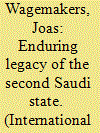

|
|
|
|
|
| Publication |
2012.
|
| Summary/Abstract |
The concept of al-wala? wa-l-bara? (loyalty to Islam, Muslims, and God and disavowal of everything else) has developed in various ways in Wahhabi discourse since the 19th century. This can partly be ascribed to the civil war that caused the collapse of the second Saudi state (1824-91) and the lessons that both quietist and radical Wahhabi scholars have drawn from that episode. In this article, I contend that Wahhabi contestations of al-wala? wa-l-bara? can be divided into two distinct trends-one social and the other political-and that both show the enduring legacy of the second Saudi state, which can still be discerned in Wahhabi scholarly writings on the subject of al-wala? wa-l-bara? today.
|
|
|
|
|
|
|
|
|
|
|
|
|
|
|
|
| 8 |
ID:
112170


|
|
|
|
|
| Publication |
2012.
|
| Summary/Abstract |
This paper explores what I call "online experiments in ethical affect" through an analysis of one popular Islamic genre: the short video segments of Friday sermons (khu?ub, s. khu?ba) placed on the video-sharing website YouTube. In my discussion of this media form, I give particular attention to the kind of devotional discourse and ethical socius that is enacted online around these taped performances: notably, the practices of appending written comments to specific videos, offering responses to comments left by others or criticisms directed at either the preacher or other commentators, and the act of creating links between khu?ba pages and other web-based content. In examining these practices, I want to look at the way some of the norms of ethical and devotional comportment associated with the khu?ba in the mosque carry over to the Internet context of khu?ba listening/viewing while also engendering novel forms of pious interaction, argument, and listening.
|
|
|
|
|
|
|
|
|
|
|
|
|
|
|
|
| 9 |
ID:
112180
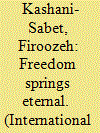

|
|
|
|
|
| Publication |
2012.
|
| Summary/Abstract |
Revolutions are chaotic affairs. In February 1979, when Ayatollah Khomeini and his followers declared victory, Iran's future seemed uncertain. After a long night of hostility and bloodshed, an eerie silence fell on Tehran, and in some corners fear supplanted exhilaration. Those of us who witnessed these historic events did not fully fathom what Islamic politics augured. Within weeks, on the occasion of International Women's Day, it became clear that women had become targets of the regime's cultural indoctrination. Other matters remained murky for months and would play out gradually in the first decade after the revolution.
|
|
|
|
|
|
|
|
|
|
|
|
|
|
|
|
| 10 |
ID:
112175


|
|
|
|
|
| Publication |
2012.
|
| Summary/Abstract |
Professional attorneyship emerged in the Ottoman Empire in tandem with the consolidation of the Nizamiye ("regular") court system during the late 19th century. This article analyzes the emergence of an Ottoman legal profession, emphasizing two developments. First, the Nizamiye courts advanced a formalist legal culture, exhibited, inter alia, by the expansion of legal procedure. Whereas the pre-19th century court of law was highly accessible to lay litigants, the proceduralization of court proceedings in the 19th century limited the legibility of the judicial experience to legal experts, rendering legal counseling almost indispensible in civil and criminal litigation. Second, the reformers made efforts to render state-granted legal license a sign of professional competence, presenting a formal distinction between the old "agents" (vekils), who lacked formal legal training, and the professional "trial attorneys" (dava vekils). In practice, however, lawyers of both categories had to adapt to the Nizamiye formalist culture.
|
|
|
|
|
|
|
|
|
|
|
|
|
|
|
|
| 11 |
ID:
112176
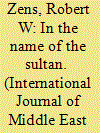

|
|
|
|
|
| Publication |
2012.
|
| Summary/Abstract |
This article examines the administration of Haci Mustafa Pasha, the military governor of Belgrade from 1793 to 1801. His appointment to this strategically located post was at odds with the contemporary trend in Ottoman provincial politics. Unlike most high-ranking provincial officials at this time, especially in the Balkans, Mustafa Pasha was not among the wealthy and militarily powerful ayan (local notables) but rather a career bureaucrat. His tumultuous and ultimately tragic administration reveals that his appointment was part of the attempt by Sultan Selim III (r. 1789-1807) to recentralize provincial governance. This study also provides a sociopolitical portrait of Belgrade and the surrounding region during the 18th century, as well as a brief look at the dangerous alliance of ayan and the janissaries.
|
|
|
|
|
|
|
|
|
|
|
|
|
|
|
|
| 12 |
ID:
112173
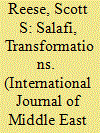

|
|
|
|
|
| Publication |
2012.
|
| Summary/Abstract |
The Islamic reformist movement known as Salafism is generally portrayed as a relentlessly literalist and rigid school of religious thought. This article pursues a more nuanced picture of a historical Salafism that is less a movement with a single, linear origin than a dynamic intellectual milieu continually shaped by local contexts. Using 1930s Aden as a case study, the article examines how a transregional reformist discourse could be vulnerable to local interpretation and begins to unpack the transformation of Salafi activism from a broad, doctrinaire, and, above all, foreign ideology to an integral part of local religious discourse. It situates reform within an evolving Islamic discursive tradition that in part developed as a result of its own theological logic but was equally shaped by local and historically contingent institutions, social practices, and power structures. It thus explores Salafism as a dynamic tradition that could be adapted by local intellectuals to engage the problems facing their own communities.
|
|
|
|
|
|
|
|
|
|
|
|
|
|
|
|
| 13 |
ID:
112177


|
|
|
|
|
| Publication |
2012.
|
| Summary/Abstract |
For the majority of Iranians who went through the Islamic Revolution of 1979 with high hopes, the "Spring of Freedom" (Bahar-i Azadi) never really bloomed except perhaps on the specially minted gold coins issued in March 1979 by the Provisional Government of Mahdi Bazargan. Revolutionary optimism quickly died out and gave way to a long winter of discontent. For the peoples of the Arab world who are presently witnessing an "Arab Spring," the turn of events may be different. Though the current movement has yet to fully unfold, potentially taking months or even years, and though it is unrealistic to generalize about all Arab countries as if they were one monolithic unit, there are features that set today's movements apart from the 1979 Iranian Revolution as much as there are striking parallels.
|
|
|
|
|
|
|
|
|
|
|
|
|
|
|
|
|
|
|
|
|